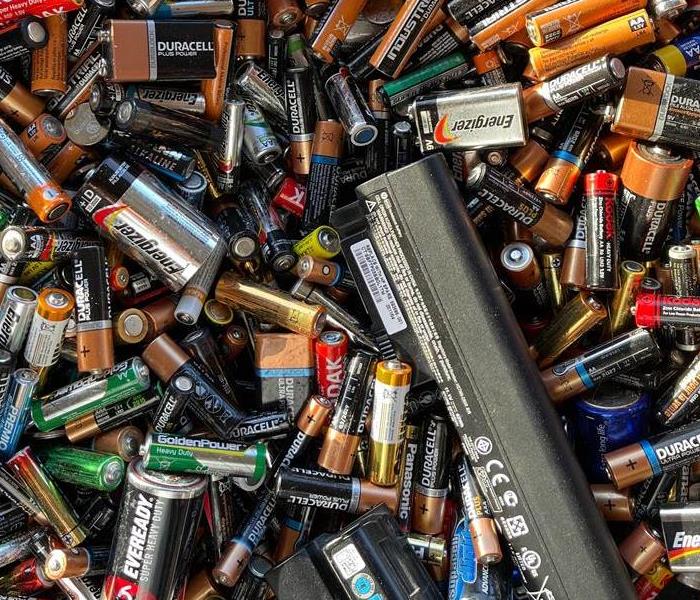Practicing Fire Safety With Lithium Batteries
8/13/2021 (Permalink)
 It is important to understand that lithium is a powerful substance that can create fire hazards in certain circumstances.
It is important to understand that lithium is a powerful substance that can create fire hazards in certain circumstances.
Lithium might ring a bell as one of the elements included on the periodic table or maybe even as the title of a classic Nirvana song. In terms of electricity, lithium tackles multiple different roles, including the power source for lithium batteries and lithium-ion batteries alike. The two different types of lithium batteries differ in their cell type and abilities to recharge, but they both allow electronic devices to run on portable energy. As a result, many of the electronic devices that we use on a daily basis employ lithium batteries. All the while, it is important to understand that lithium is a powerful substance that can create fire hazards in certain circumstances. Keep reading in order to learn more about the steps that you can take to prevent fire damage caused by lithium batteries in your residential or commercial building.
Why Are Lithium Batteries Such a Concern?
While risks accompany lithium batteries, they are still safe for everyday use. Unless they short-circuit or overheat to a certain degree, both of which are rare occurrences, lithium batteries can be used safely on a regular basis. However, overheating and overcharging can both cause electronic devices to release a significant amount of heat, increasing the risk of fire. You may have seen recent news stories about cell phones and hoverboards going up in flames on hot days, but these circumstances are extraordinarily rare. As a matter of fact, the United States Postal Service categorizes lithium batteries as Class 9 hazards, a category consisting of miscellaneous hazardous materials that are only dangerous in transit situations.
Preventing Lithium Battery Fires This Summer
In our everyday lives, lithium batteries and lithium-ion batteries play important roles by powering devices of all kinds, from electric toothbrushes to cell phones and laptops. During the summer season, the risk of fires resulting from overheating increases under the scorching summer sun. You can protect your residential or commercial property from an unwanted lithium battery fire this summer by adhering to fire safety procedures. One preventative measure is making sure that electronic devices are not left lying idle in hot environments such as hot cars or under the sun for prolonged periods of time. Additionally, it is a good idea to avoid charging electronic devices in hot environments. Charging your devices can be made safer by avoiding overcharging and utilizing a high-quality charger. It may also be helpful to purchase a strong case for your device that will effectively protect its battery from potential damage.
Have You Experienced Fire Damage? Call SERVPRO
Even if preventative measures are put in place, it is still possible for the unimaginable to happen. That’s why SERVPRO of Metro Pittsburgh East is “Ready For Whatever Happens” and always standing by in the event that an emergency occurs. Whether it’s a lithium battery or a different catalyst that causes a fire to ignite and cause damage to your property, SERVPRO can help. As a leading name in the fire damage restoration industry, we offer top-of-the-line Commercial Fire Damage Restoration Services and Fire Damage Restoration Services for residential properties. For immediate services and the best chance of preventing any further fire damage, call SERVPRO of Metro Pittsburgh East right away at (412) 672-5400. You can learn more about our Fire Restoration Process and other fire-related services, such as how we care for your fire damaged belongings by visiting our website. Trust SERVPRO and our 24-Hour Emergency Services to help you restore your residential or commercial property to its preloss condition in the event of a fire.





 24/7 Emergency Service
24/7 Emergency Service